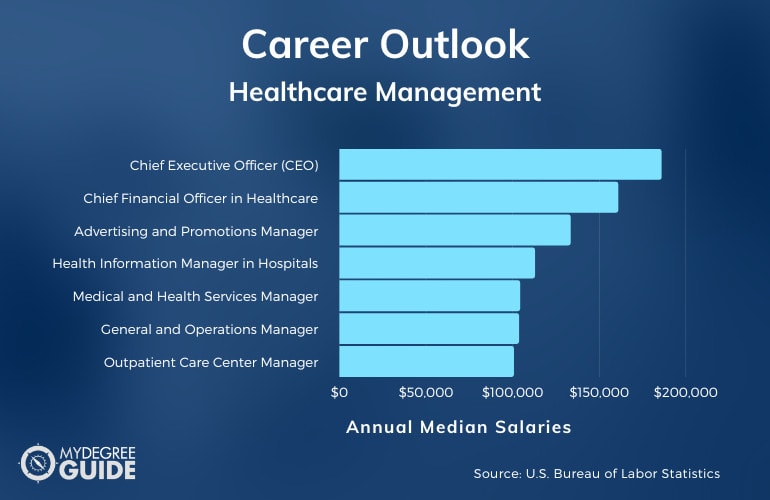Explore Masters in Healthcare Management Online for 2024. Compare master’s programs, schools, career options, and salaries.

A masters in healthcare management online degree will prepare you to lead healthcare organizations.
As the population ages and medical needs increase, jobs in this sector are growing quickly.
Editorial Listing ShortCode:
By earning a healthcare administration online degree, you can stay in the workforce while getting ready for the next step in your career.
Master in Healthcare Management Online Degrees
A number of accredited universities now offer online master’s programs in healthcare management (or healthcare administration).
Select the program that most interests you to jump to that section of the guide:
Although healthcare management and healthcare administration are closely related fields, the day to day responsibilities can differ considerably depending on your workplace.
Master’s in Healthcare Management

If you’re interested in being in charge of the big-picture direction of a healthcare organization, then a master’s in healthcare management may be the degree for you. As a healthcare management professional, you can oversee the business decisions that guide operational choices in a hospital or a clinic.
You might also be in charge of setting policies and maintaining high standards for quality of care.
Editorial Listing ShortCode:
After completing an overview class that surveys the American healthcare model, you will likely take courses on business analytics for decision-making and information technology for medical settings. You may also study healthcare law, budgeting and project management.
With a healthcare management degree, you could be one of the top leaders in a medical organization and hold a title like executive director or hospital administrator. You could work for the government as a public health director. Other potential employers include correctional facilities, insurance companies and pharmaceutical companies.
Master’s in Healthcare Administration

Medical organizations depend on strong, talented teams of healthcare professionals. If your career goal is to oversee these people and encourage their contributions to your organization’s mission and to the healthcare industry in general, then you may be a good fit for earning an online master’s in healthcare administration program.
This degree program can equip you to supervise staffing needs and issues in a healthcare industry setting.
Editorial Listing ShortCode:
This degree program typically includes classes on healthcare delivery systems, organizational leadership, finance and budgeting, data management, and healthcare law. You may also learn about applying your administrative skills in various settings, such as public health organizations, long-term care facilities and hospitals.
Healthcare administrators often oversee particular departments within an organization, so you might be in charge of an area like hospice care or medical records. You could also hold a management role in a clinic, a group or individual medical practice, a nonprofit organization, or a public health department.
Healthcare Management Careers & Salaries

With an online masters in healthcare management, you may have many job possibilities available to you. According to the U.S. Bureau of Labor Statistics, jobs for medical and health services managers are growing at an 32% rate. This is well above the national average for job growth.
Hospitals are some of the top employers for managers of healthcare. Medical practices, such as group doctor’s offices, can also use these professionals. Either type of organization would be a good place to start your job search.
Other places you might work include long-term care homes, nonprofit community organizations, and correctional facilities. Public health departments also need leaders with management training.
In these organizations, you could hold a variety of different titles. Some people with a healthcare management masters degree are executive directors or chief executive officers. Others are healthcare managers, practice administrators, operations vice presidents, or program directors.

In addition, the business background of your degree may qualify you to take leadership roles in many different departments throughout a healthcare system. For example, you could be a human resources manager, a project manager, or a financial analyst.
Editorial Listing ShortCode:
You could also consider a career as a consultant for health services organizations. In that role, you might travel from one healthcare organization to another. Your job would involve analyzing each group’s business structure and providing suggestions for improvement.
The median annual wage for a master’s degree holder in the medical and health services management field is about $80,000, according to the Center on Education and the Workforce.
According to the Bureau of Labor Statistics, some careers in the healthcare management field include:
| Careers | Annual Median Salary |
| Chief Executive Officer (CEO) | $185,950 |
| Chief Financial Officer in Healthcare | $160,950 |
| Advertising and Promotions Manager | $133,460 |
| Health Information Manager in Hospitals | $112,870 |
| Medical and Health Services Manager | $104,280 |
| General and Operations Manager | $103,650 |
| Outpatient Care Center Manager | $100,690 |
| Administrative Services Manager | $98,890 |
| Nursing Home Administrator | $89,880 |
| Management Analyst | $87,660 |
Salary figures vary throughout the country. Your rate of pay may depend on your employer, your job title, and your experience.
Healthcare Management Specializations & Concentrations

You may want to focus your studies on a particular aspect of healthcare management. Developing your expertise in one area of this field may set you apart as a strong candidate for the jobs that most appeal to you.
- International Management – If you want to run medical practices in international settings or focus your career on worldwide public health, courses on informatics, biostatistics, economics, and system design can help you accomplish that goal.
- Legal Issues in Healthcare – In this concentration, you can study privacy law, insurance regulations, licensure, and other legal issues that will affect the decisions you make in your medical organization.
- Population Health – You can learn to use data informatics and other management skills relevant to the healthcare industry to improve the wellbeing of entire communities, perhaps in public health settings.
- Supply Chain Management – Studying topics like logistics, procurement, human capital, and quality assurance can help you be ready to oversee your hospital’s procedures for obtaining supplies and delivering services to patients.
Concentration options vary widely from school to school, so you may want to compare many colleges’ offerings before deciding which specialization to pursue.
Choosing a Master’s in Healthcare Management Degree

You want to get the most value possible out of your degree in healthcare management, so you should choose your college carefully. It’s a good idea to consider multiple characteristics of various programs before deciding where to apply.
Editorial Listing ShortCode:
Features to consider include:
- Accreditation – The most reputable graduate schools hold regional accreditation from an organization approved by the Council for Higher Education Accreditation.
- Cost – The tuition may be most affordable at schools that charge the lowest amount per credit hour, but the required number of credits and the financial aid package you are offered will also factor into the overall cost.
- Degree type – Some schools offer a Master of Business Administration (MBA) in Healthcare Management. Others offer Master of Healthcare Management or Master of Science (MS) in Healthcare Management degrees.
- Format – Some schools offer fully online programs, but others require a certain amount of time on campus in addition to the healthcare administration online classes.
- Outcomes – Programs often publish data on companies that have hired their graduates or the employment rate after finishing the program, and that information may factor into your school selection.
- Specializations – Some concentrations are offered only at a select few schools, so having a particular focus in mind may limit the number of colleges that you consider.
- Time to completion – If your goal is to earn your degree quickly, then look for a program that boasts a short program length, or choose one that lets you progress at your own pace.
You may have other characteristics that are important to you as well, so make a list of your priorities, and then research which schools’ programs might be the best fit.
Master’s in Healthcare Management Curriculum & Courses

For your master’s program, you may need to earn around 30 to 36 credit hours. To accomplish that goal, you’ll take an assortment of classes related to the healthcare industry, business, leadership, and technology.
- American Healthcare Systems – This introductory class can give you an overview of modern healthcare delivery systems. You can learn about providers, payers and the roles that politics and government play.
- Analytics and Business Decisions – Learning to gather and interpret data can equip you to make smart business decisions that can help your organization thrive.
- Business Communications – In this class, you can learn about delivering information to employees, suppliers, patients and the public. You may discuss cross-cultural communication.
- Change Management – This course can train you to lead teams through times of transition and help people buy into the changes.
- Financial Accounting for Health Organizations – Successful financial accounting requires the ability to track transactions with many different types of payers.
- Health Law – In this course, you can explore how legal regulations influence day-to-day healthcare practice. You may also talk about your ethical responsibilities as a healthcare manager.
- Information Technology for Healthcare – You can learn about current systems for gathering, recording, and organizing healthcare data, and you may also learn techniques for keeping up with new technologies as they are released.
- Organizational Leadership – To lead a healthcare organization well, you must have a strong understanding of team dynamics, conflict resolution, and strategic management.
- Quality Management – This course covers techniques for analyzing healthcare quality and making improvements as needed.
- Value Chain in Health Management – You can learn about the various parts of the healthcare supply chain, such as payers and providers.
Many healthcare management programs end with a capstone project. For this assignment, you’ll be asked to demonstrate what you’ve learned and how you can apply this knowledge to real-world healthcare scenarios.
Admissions Requirements

Before you can begin a graduate degree program, you must be accepted. Your application packet may need to include the following components:
- Essay – A short paper on your academic and professional goals can help schools determine whether your plans align with their programs.
- Personal information – You’ll need to fill out a form that lists your name, birth date, and contact details and indicates which degree program interests you.
- Transcripts – Providing a record of your past studies confirms that you graduated from a baccalaureate program and shows what GPA you earned.
- Test scores – Some schools require applicants to take the GRE. You may be able to have this requirement waived.
Compiling an application packet that showcases your strengths may increase your standing in the eyes of the admissions committee.
Accreditation

Schools can earn regional accreditation by demonstrating that they consistently offer rigorous academic programs that do a good job of preparing their students to enter the workforce.
The U.S. has seven organizations that are authorized to grant regional accreditation. They include the Higher Learning Commission (HLC) and the Northwest Commission on Colleges and Universities (NWCCU).
If you want the option to transfer your credits to another school or enroll in a doctoral program, it’s important to take your classes from an accredited college. An accredited degree can also be helpful when applying for jobs.
The U.S. Department of Education maintains a database of accredited programs.
Healthcare Management Professional Organizations

Joining a professional organization can provide opportunities to network with other healthcare managers and stay in touch with industry happenings. These organizations often hold conferences, send out publications, run online communities, and offer career resources.
Editorial Listing ShortCode:
As a group member, you may be able to take advantage of professional discounts or continuing education resources.
- American Association of Healthcare Administrative Management – AAHAM offers professional development and advocacy for people whose jobs relate to the healthcare revenue cycle.
- Association of Healthcare Administrative Professionals – AHCAP’s membership roster is made up of executive assistants and others who provide administrative services for top healthcare leaders.
- Health Care Administrators Association – HCAA advocates for self-funding approaches to healthcare and represents healthcare leaders, including those who manage benefits, technology, or human resources.
Accessing a group’s benefits usually requires an annual membership fee, but student rates may be available while you are earning your degree.
Financial Aid & Scholarship

The government offers financial aid that may help you afford your online master’s degree. The process for qualifying begins with filling out the Free Application for Federal Student Aid (FAFSA).
Based on your FAFSA results, you may qualify for student loans from the government, which usually have low-interest rates. You may also receive grants that won’t need to be paid back after graduation.
Your state may offer similar financial aid programs, so you may be able to take advantage of both state and federal help.
Scholarships are another source of valuable financial assistance. These are monetary gifts that can help with your school tuition or fees. Scholarships are often given by industry organizations, colleges, and philanthropic groups.
Many scholarship programs choose only one or two winners each year, so these awards can be competitive. Applying for an assortment of scholarships may increase your chances of being selected as a recipient.
What Jobs Can I Get With a Masters in Healthcare Management?

After graduating with an online master’s in healthcare management, you will probably pursue a job that involves running the business side of a healthcare organization.
Potential job titles include healthcare manager, project manager, practice administrator, or healthcare administrator. As you move up in an organization, you might take executive roles like VP of Operations or CEO.
Editorial Listing ShortCode:
You could also work as a consultant who advises multiple healthcare organizations on administrative operations.
What Is the Best Masters Degree to Get in Healthcare?
Your future career goals should play an influential role in deciding what type of healthcare master’s degree to earn.
Healthcare management degrees may be best if you want to head up the business aspects of a large medical organization. If you plan to oversee healthcare staffing or supervise specific departments, then you might prefer a degree in healthcare administration instead.
How Much Do You Make With a Degree in Healthcare Management?

The average annual salary for people with healthcare management master’s degrees is $80,000 (Center on Education and the Workforce), but some jobs in healthcare management pay more than others.
For example, you might earn $185,950 per year as a hospital CEO or $104,280 as a health services manager or clinical manager per year.
Gaining additional experience or pursuing certification may increase your masters in healthcare management salary.
Is an MHA Degree Worth It?
As the demand for healthcare grows, the need for additional administrators grows as well. Jobs for medical and health services managers are currently increasing at a rate of 32%.
You may be able to apply your education in health services organizations such as hospitals, group practices, long-term care facilities, public health departments, or insurance companies. Because medical organizations depend on the services of administrators with expertise, this master’s degree may give you an advantage during your job search.
How Long Does it Take to Get an Online Master’s in Healthcare Administration?

Online degrees in healthcare management or administration often take around two years to complete. Some programs are shorter and can be completed in 18 months or less. Others allow for self-pacing, so you can choose how quickly to move through the program.
The number of credit hours required is one factor that affects program length. Internships may also extend the length of your studies in your healthcare management program.
Are there any Affordable Online Masters in Healthcare Administration Programs?
The total cost of your MHA program will depend on the school’s tuition cost per credit hour and the number of credits required for graduation. Many MHA schools charge around $600 to $700 per credit hour. Others cost $1,000 per credit hour or more.
Editorial Listing ShortCode:
To save on tuition costs, look into financial aid and scholarships. Inquire with the school about whether you can transfer in previous coursework or receive credit for prior knowledge.
What Can I Do With an MHA?

Unlike with a bachelor’s or associate’s healthcare management online degree, your master’s degree in healthcare administration can prepare you for supervisory positions in hospitals and other health organizations. You might oversee departments or entire agencies.
MHA programs often focus on the staff-management side of a healthcare administration program. You may study organizational leadership, team dynamics, human resources, and quality management. These classes can prepare you to take roles like operations director, practice administrator, or program manager.
What is an MHA?
The acronym MHA stands for Master of Health Administration or Master of Healthcare Administration.
In this program, you can learn how to oversee the staff of medical organizations. After graduation, you can draw on your organizational leadership skills as you hold your personnel to high standards of quality care and ethical practices in the healthcare industry.
The courses also typically cover healthcare delivery systems, health law, finance and budgeting, information technology, and population health.
What’s the Difference Between an MBA and an MHA?

A traditional or online MBA in healthcare management is a business degree with an emphasis on healthcare management. You may be best-suited for this program if you intend to oversee business operations in a healthcare system. With this degree, you may rise to some of the top executive roles in an organization.
Editorial Listing ShortCode:
An MHA is a healthcare administration degree. It’s similar to a healthcare management degree but typically places a greater emphasis on coordinating personnel and individual departments.
Universities Offering Online Master’s in Healthcare Management
Methodology: The following school list is in alphabetical order. To be included, a college or university must be regionally accredited and offer degree programs online or in a hybrid format.

Arizona State University is an internationally known public school that began in 1886. As a leader in research and innovation, ASU assists students in learning to solve real-world problems in its many graduate and undergraduate degree programs. Teaching leadership, compassion, and social awareness is essential values at ASU.
Arizona State University is accredited by The Higher Learning Commission.

Brenau University is a dynamic private postsecondary facility that teaches students to be future leaders through distance learning and traditional campus courses. BU open in 1778 and now works with students worldwide that wish to earn a two-year, four-year, postgraduate, or professional degree.
Brenau University also has a renowned women’s college.
Brenau University is accredited by the Southern Association of Colleges and Schools Commission on Colleges.

Capella University has been changing the way students do education since they began in 1993. Capella allows students an affordable and flexible option for earning a bachelor’s, master’s, doctoral, or Ph. D., Capella University has guided classes and self-paced classes to help students have control of their learning.
This private school is an international leader in the education field.
Capella University is accredited by the Higher Learning Commission.

Clarkson University has been welcoming students into a community of creativity and innovation since 1896. This world-renowned private school encourages students to exceed their expectations while earning an undergraduate, master’s, doctoral, or Ph.D. in an array of academic disciplines.
Research and technology are imperative for Clarkson University student’s success.
Clarkson University is accredited by the Middle States Commission on Higher Education.

Colorado Technical University ranks among the best as a military-friendly school by Military Advanced Education. It opened in 1965 and has expanded globally to teach in-demand work skills to students who are inspired to grow in their profession.
With an array of programs that lead to undergraduate, graduate, and doctoral degrees, CTU helps make student success a valid option.
Colorado Technical University is accredited by the Higher Learning Commission.

Concordia University-St. Paul Commenced in 1893 and excels at providing a faith-based education to students working towards a higher level of education. Offering an assortment of academic majors, CUSP has a path to gain a two-year, bachelor’s, postgraduate, or doctoral degree.
Popular degrees at CUSP include business, healthcare, music, and science.
Concordia University-Saint Paul is accredited by The Higher Learning Commission.

Located only a few hours from popular beaches, East Carolina University has a large assortment of degree options that help students obtain an undergraduate, graduate, or professional degree.
ECU commenced in 1907as a public institution, and with the advancement of technology, has spread across the US and into several other counties through its distance learning options.
East Carolina University is accredited by the Southern Association of Colleges and Schools Commission on Colleges.

Opening in 1965 and known as the state’s only public university that offers degrees in both law and medicine, Florida International University has over 190 other degree majors and minors to choose from. Research and innovation are vital concepts to FIU’s educational system, which strives to provide dynamic hand-on learning to all students.
Florida International University is accredited by the Southern Association of Colleges and Schools Commission on Colleges.

Sitting in the heart of the nation’s capital, George Washington University opened n 1821 as a private research college that has educated some of the highest political figures. Students who are looking for a prestigious degree, ranging from an associate to a doctoral, can choose from hundreds of academic programs at GWU.
George Washington University is accredited by the Middle States Commission on Higher Education.

At its world-renowned research facilities and educational programs, Johns Hopkins University helps students gain an undergraduate, graduate, or doctoral degree in more than one-hundred academic programs. Research is not just a part of the private university but is ingrained in its core applications that are recognized globally.
Johns Hopkins University is accredited by the Middle States Commission on Higher Education.

Created in 1919, Kettering University allows students to gain a private education while receiving hands-on experience from professionals in their field. Offering a variety of bachelor’s and master’s degrees in the areas of STEM and business, Kettering University serves more than 2000 students every year.
All students at KU must take part in five co-operative education experiences before graduation.
Kettering University is accredited by The Higher Learning Commission.

As one of the nation’s leaders in private education, Liberty University found its beginning in 1771. Liberty University has over 600- academic programs that help students earn a two-year, four-year, graduate, or professional degree in their field.
This Christian university encourages students to display critical thinking and leadership skills to help the world become a better place.
Liberty University is accredited by the Southern Association of Colleges and Schools Commission on Colleges.

Beginning as a Catholic school in 1905, Marist College is a liberal arts university that uses a faith-based curriculum to assist students in obtaining an undergraduate or graduate degree.
Nestled beside the Hudson River, this private university engages students in campus activities and community service. Study abroad programs are also available at MC.
Marist College is accredited by the Middle States Commission on Higher Education.

Offering degrees in all areas of healthcare, Nebraska Methodist College was created in 1891. This private academic institution allows students to learn by doing with their many hands-on learning activities and paves the way for obtaining all degree-levels. Every degree earned at NMC incorporates a liberal arts foundation.
Nebraska Methodist College is fully accredited by The Higher Learning Commission.

Searching for new ways to make a positive impact on the world, Students attending Northeastern University discover that learning happens inside and outside the classroom. NU has a variety of programs that lead to undergraduate and graduate degrees. NU opened in 1898 and has been offering a dynamic private education ever since.
Northeastern University is accredited by the New England Commission of Higher Education.

Opening in 1950, Oklahoma Christian University that was started by the Church of Christ. OC provides private education to students while also teaching them the fundamentals of living a Christian life. OCU accepts students of all religions and teaches care, respect, and kindness for others while offering a path to an undergraduate or graduate degree.
Oklahoma Christian University is accredited by the Higher Learning Commission.

Commenced in 1982, Parker University is well known for its associate, undergraduate, graduate, and doctoral degrees in the fields of busiess, healthcare, and technology. As a private school, Parker University provides an affordable option to gain hands-on experiences in its academic areas and even has a chiropractic center on campus.
Parker University is accredited by the Southern Association of Colleges and Schools Commission on Colleges.

Established in 1929, Quinnipiac University has a variety of program options for students interested in gaining an undergraduate, graduate, or professional degree. Students attending Quinnipiac have the opportunity to take courses on one of three campuses, and many programs are offered through an online learning format.
Quinnipiac University is accredited by the New England Commission of Higher Education.

Enrolling over 2,000 students every year, Saint Leo University is one of the top private, faith-based schools in Florida by U.S. News & World Report. Saint Leo’s opened its doors as a student-centered educational facility in 1889.
Based on the idea of making the world a better place, SLU incorporates liberal arts in all of the undergraduate, graduate, ad doctoral degrees it offers.
Saint Leo University is accredited by the Southern Association of Colleges and Schools Commission on Colleges.

Southeast Missouri State University opened in 1873 and now serves thousands of students as an internationally known public school. SMSU allows students learning options that include flexible campus times, and distance learning opportunities so they can have access to one of the many undergraduates, graduate, and doctoral offered.
Southeast Missouri State University is accredited by the Higher Learning Commission.

Opening in 1947, Stevenson University provides private education to students looking to leaders in their community and their academic field. Offering a range of degree options, students at Stevenson University have the opportunity to gain a bachelor’s, master’s, or doctoral degree. Popular programs include healthcare, business, and technology.
Stevenson University is accredited by the Commission on Higher Education, Middle States Association of Colleges and Universities.

Established in 1863, The University of Massachusetts- Amherst provides an assortment of academic paths that lead to an undergraduate, graduate, or doctoral degree. UMass-Amherst is a world-renowned public school that is known for being military friendly and socially diverse.
Offering distance learning opportunities and study abroad options sets UMass-Amherst apart for the rest.
The University of Massachusetts Amherst is accredited by the New England Commission of Higher Education.

Originally a school for women, the University of Saint Mary opened in 1923. Today, USM is co-educational and prepares students to be leaders in their industries by providing a path to an undergraduate or graduate degree with a faith-based curriculum. The University of Saint Mary offers both online and campus-based learning platforms.
The University of Saint Mary is accredited by the Higher Learning Commission of the North Central Association of Colleges and Secondary Schools.

Founded on the teachings of the Jesuit culture in 1888, the University of Scranton incorporates spirituality and compassion into all of its bachelor’s and master’s programs. This private university has more than ninety academic majors and minors to choose from and challenge its students to become deep thinkers and positive leaders in society.
The University of Scranton is accredited by The Middle States Commission on Higher Education.

Serving as a public research university, the University of Texas- Dallas has been open since 1961. Today UTD comprises eight schools and over fifty research centers where students have access to more than 140-degree programs that lead to a graduate, undergraduate, or doctoral degree.
Some research projects associate with UTD includes science, behavior, and brain studies.
The University of Texas at Dallas is accredited by the Southern Association of Colleges and Schools Commission on Colleges.

The University of Texas – Tyler was established in 1971 and sits on a 400-acre campus that surrounds Harvey Lake. This dynamic public school enrolls more than 10,000 students who seek a bachelor, master, and doctoral-level degree every year. UTT has more than 90 academic programs to choose from, which are offered online and in-person.
The University of Texas at Tyler is accredited by the Commission on Colleges of the Southern Association of Colleges and Schools.

Walsh University began in 1960 and has since worked hard to ensure students’ success in educating the mind, body, and soul. As a private Catholic university, Walsh believes learning should involve hands-on learning experiences such as internships and service projects.
Each bachelor’s, master’s, and a doctoral degree from WU blends academic and spiritual learning.
Walsh is accredited by the Higher Learning Commission.

Known as one of the safest places to study in TX, West Texas A&M University is a public postsecondary school that began in 1910. Success, research, and courage are encouraged in all of West Texas A&M’s bachelor’s, master’s, and doctoral programs and encompasses the ideals outlined in its motto.
West Texas A&M University is accredited by the Southern Association of Colleges and Schools Commission on Colleges.

Western governors University began in 1997 as a private option for students looking to gain higher education through an alternative option. With an array of undergraduate and graduate degrees, WGU allows students to learn online on a self-paced schedule.
Allowing credit through comprehensive exams, work experience, or military training says WGU apart from others in the field.
Western Governors University is accredited by the Northwest Commission on Colleges and Universities.

Wright State University has more than 230 majors that allow students the ability to find a degree program that fits their needs. Students at Wright State can earn a bachelor’s, master’s, and a doctoral degree from a national public research university that has been serving the community since 1967.
Some of their prominent programs include computer science, health care, and business.
Wright State University is accredited by the Higher Learning Commission.
Getting Your Master in Healthcare Management Online

If you have your sights set on being a healthcare executive, healthcare management degrees may be the first step toward achieving that goal. This business-focused program can teach you to oversee finances, personnel, information technology, and long-range planning for healthcare organizations.
Earning your degree online in a healthcare management program may allow you to remain in the workforce while earning your degree. This may provide many opportunities to apply your classroom lessons right away.
If you’re ready to take the next step toward an executive role in healthcare leadership, submit applications to online healthcare management master’s degree programs.

